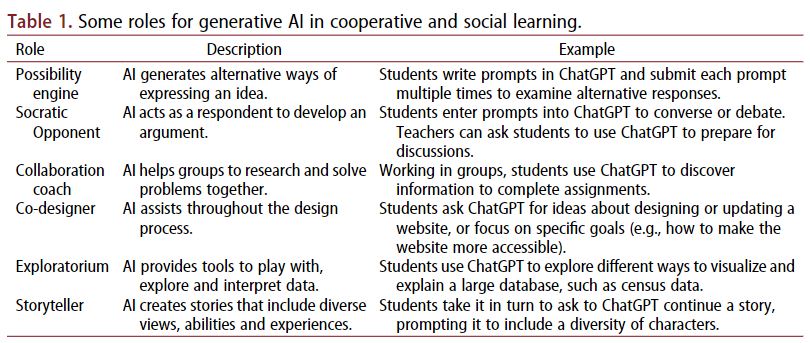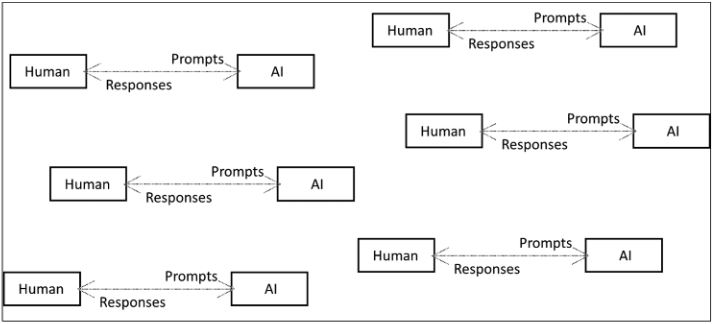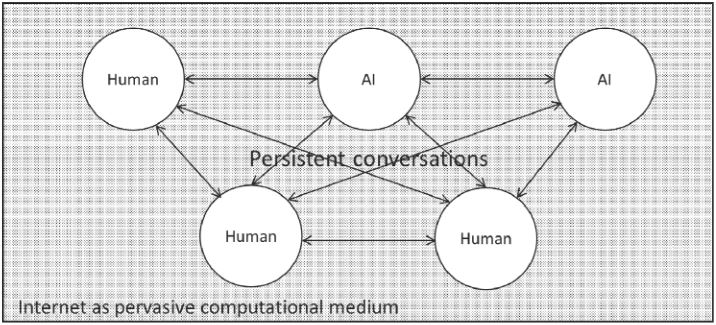Mike Sharples skizziert in einem aktuellen Beitrag für die Zeitschrift “Learning: Research and Practice” eine Zukunftsvision: “Generative AI as a full participant in social learning”.
Mike Sharples ist Professor emeritus for Educational Technology an der Open University UK. Für das aktuelle Sonderheft der Zeitschrift “Learning: Research and Practice” zum Thema “Learning in the Age of Generative Artificial Intelligence” hat Sharples eine Vision dazu formuliert, wie generative KI künftig soziales und kooperatives Lernen unterstützen könnte.
In seinem Beitrag skizziert Sharples einige der Rollen, die generative KI wie z.B. ChatGPT gegenwärtig in kooperativen und sozialen Lernprozessen übernehmen kann:

Die Logik hinter diesen Szenarien charakterisiert Sharples als “systems view of generative AI in education”:
Most discussions about the impact of generative AI on education assume that an individual student or teacher interacts with a GenAI system through a series of prompts and responses.

Vor dem Hintergrund (1) der Bedeutung von kooperativem und sozialen Lernen und (2) der Integration von Assistenzsystemen auf der Grundlage generativer KI in Office sowie Social Media Applikationen (z.B. MS Copilot), erscheint ihm dies nicht mehr ausreichend. Aus seiner Sicht braucht es eine andere Perspektive: “generative AI as a participant in conversations for learning”.
Generative AI has the potential to contribute to this social learning process of setting shared goals, performing tasks together, exploring possibilities, and conversing to reach agreements.
Sharples illustriert diese Idee anhand des folgenden Schemas:

Damit diese Vision von Lerndialogen, die einzelne Interaktionen mit genKI-Apps zusammenbinden, Wirklichkeit werden kann, braucht es technische Weiterentwicklungen:
To support full conversations for learning, GenAIs must be designed to set explicit goals, have long term memory, build persistent models of their users, reflect on their output, learn from their mistakes, and explain their reasoning. This will require new hybrid AI systems that combine neural networks and symbolic AI.
Es braucht darüber hinaus auch ein angepasstes Rollenverständnis von Lehrpersonen bzw. Bildungsverantwortlichen:
Human teachers and experts have fundamental roles in such a distributed system as initiators and arbiters of conversations for learning, as sources of specific knowledge, and as nurturing and caring role models who deserve respect.
Bevor er sein Fazit formuliert, greift Sharples auch mögliche Missverständnisse bezüglich seiner Zukunftsvision auf:
It is important to note that this does not assume AI will think or act as a human – only that it could be capable of participating in conversations for learning, bringing its own capabilities to dialogues such as its immediate access to internet tools.
(…)
The result could be a new online space for educational dialogue and exploration that merges human empathy and experience with networked machine learning.
Sharples, M. (2023). Towards social generative AI for education: Theory, practices and ethics. Learning: Research and Practice, 9(2), 159–167. https://doi.org/10.1080/23735082.2023.2257234
Schreiben Sie einen Kommentar